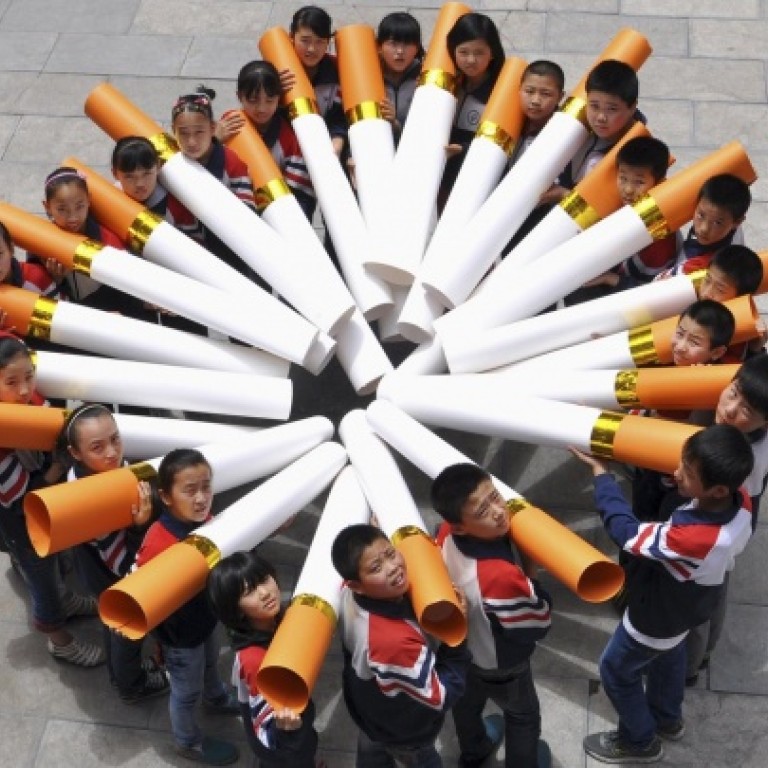
China's inertia on tobacco control 'promises costly tsunami of illness'
Tobacco control chief warns of costly tsunami of illness and death by 2030 if smoking bans and education campaigns not stepped up
Mainland tobacco control campaigners liken their battles for more obvious and graphic health hazard warnings on cigarette packs and a ban on the promotion of tobacco products on social media sites to disarming a ticking time bomb.

More than 300 million mainlanders smoke, with another 740 million people regularly exposed to second-hand smoke, official figures show.
The deputy director of the National Office of Tobacco Control, Jiang Yuan, said the prevalence of tobacco use on the mainland was shown in side effects such as people having strokes at younger ages and a steady increase in the number of children with asthma.
"Without effective control of tobacco use, by 2030 chronic disease will increase dramatically, like a tsunami," she said this week, ahead of today's World No Tobacco Day.
The WHO says tobacco is responsible for a million deaths on the mainland every year and a quarter of the men who die from tobacco-related non-communicable diseases are younger than 60, resulting in major economic implications for an ageing society such as China.
"If China cannot effectively control the tobacco use of current smokers or prevent a rising number of young smokers, China will face a heavy burden of non-communicable disease," said Professor Yang Gonghuan , former director of the National Office of Tobacco Control and a professor of public health at the Peking Union Medial College.
"The burden lies not only in the deaths but also many more who live with the diseases. The increasing medical bills, even with expanded public medical insurance, will pose a great challenge to the government. Any sensible administration should take that very seriously."
The central government expressed support for the global effort to curb tobacco use when it ratified the WHO Framework Convention on Tobacco Control in 2005, but the mainland has yet to make serious progress in curbing tobacco use.
It missed the convention's 2009 deadline to implement a complete ban on smoking in public places, and a national law on banning smoking in public venues is a long way down the government's list of legislative priorities.
"Among the eight government agencies involved, only the health authority and the education ministry are taking this very seriously," the deputy director of the tobacco-control NGO Think Tank Research Centre for Health Development, Wu Yiqun , said. "A lot of work has been done and slow progress has been made possible by non-government organisations."
Wu criticised the Ministry of Industry and Information Technology, which was appointed to lead the tobacco control mission.
The ministry released a China Tobacco Control Programme (2012-15) in December after more than two years of deliberation. It mentions expanding the size of warning labels on cigarette packs and the use of colours to warn buyers but stopped short of recommending packs carry graphic warning images, such as skeletons and damaged lungs, which have proved very effective in discouraging smoking overseas.
The plan was drawn up by the State Tobacco Monopoly Administration, one of the eight government agencies involved. The mainland is one of the few markets in the world that has state-owned monopolies running tobacco production and trade, via the China National Tobacco Corporation. It is also the world's largest tobacco producer and tobacco has been its top source of tax revenue since 1987.
Academics say the tobacco industry benefits the government's coffers much more than the wider economy. Research by Yu Hui from the Chinese Academy of Social Sciences for the ChangCe Thinktank found that tobacco farmers, production workers and the transport sector did not need to rely on the tobacco industry.
The report found that profits from growing other agricultural products would far exceed those from tobacco farming and that such new products would absorb nine times the number of workers in the tobacco industry.

